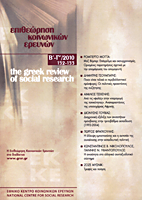Max Weber, vocation and modernization: Some remarks concerning the disenchantment of the disenchanter
Abstract
In order to understand the significance of weberianism and its spread, two aspects should be taken into account. On the one hand, the meaning of some concepts. What, for instance, do Beruf mean in Weber’s writings and how does it differ from similar concepts in other systems of thought? Critics have demonstrated beyond a reasonable doubt that the Berufsethik attributed by Weber to Luther and Calvin is in essence the same as the éthique du devoir which was common place among Catholic authors in 17th and 18th centuries. On the other hand, there is the issue of the «use value» of weberianism in countries like Brazil or France. For even if Weber is wrong in his theological treatment of vocation, he remains the outstanding analyzer of the process of rationalization and the announcer, the «philosopher» and indeed the «prophet» of a modernity that he and many of his interpreters have conditioned to the acceptance of the «Protestant Ethic».
Article Details
- How to Cite
-
Μόττα Ρ. (2010). Max Weber, vocation and modernization: Some remarks concerning the disenchantment of the disenchanter. The Greek Review of Social Research, 132, 3–29. https://doi.org/10.12681/grsr.12
- Issue
- 2010: 132-133, Β-C
- Section
- Articles

This work is licensed under a Creative Commons Attribution-NonCommercial 4.0 International License.
Authors who publish with this journal agree to the following terms:
- Authors retain copyright and grant the journal right of first publication with the work simultaneously licensed under a Creative Commons Attribution Non-Commercial License that allows others to share the work with an acknowledgement of the work's authorship and initial publication in this journal.
- Authors are able to enter into separate, additional contractual arrangements for the non-exclusive distribution of the journal's published version of the work (e.g. post it to an institutional repository or publish it in a book), with an acknowledgement of its initial publication in this journal.
- Authors are permitted and encouraged to post their work online (preferably in institutional repositories or on their website) prior to and during the submission process, as it can lead to productive exchanges, as well as earlier and greater citation of published work (See The Effect of Open Access).
Downloads
Download data is not yet available.



